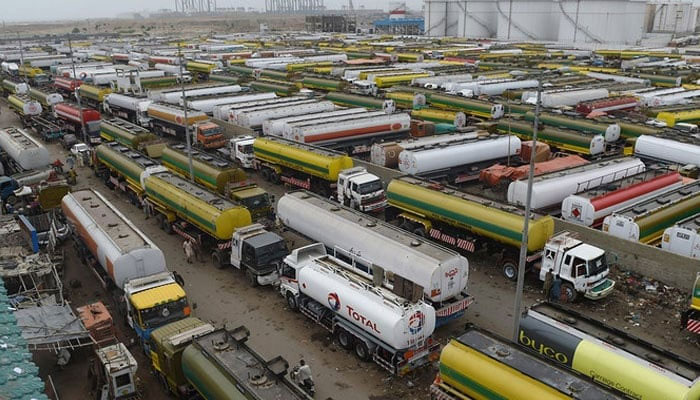Fuel oil exports hit half-million tonnes amid local demand shift
KARACHI: The country exported over 500,000 metric tonnes of fuel oil in the first eight months of the current financial year, as tepid local demand shifted sales overseas, industry data showed on Tuesday.
Refineries refrained from exporting fuel oil in February when domestic consumption increased for power generation. According to the figures, the highest export of fuel was recorded in the month of December when the country exported over 135,000 metric tonnes; however, it dropped in January when local power plants started lifting the furnace oil for power generation as its export dropped to 89,000 metric tonnes in the month.
The month of February didn’t see any export of fuel oil after the local refineries were able to sell it in the local market. During the current month, the country may export the furnace oil as its local consumption has slumped, according to industry experts.
Fuel oil demand has surged in recent month as hydel power generation plants took a hit as heavy snowfall in the northern parts of the country squeezed water flows in the Indus River, which is the primary source of water supply into the reservoirs used for generating electricity, industry sources said.
Fuel oil exports from Pakistan had stopped in January as domestic demand surged for electricity generation due to lower hydropower output amid canal closures, and without exporting in February this year, the country made a record export of fuel oil, i.e., 535,000 metric tonnes.
On the other hand, the import data of petroleum products showed that the import of high-speed diesel (HSD) decreased in the month of February of this fiscal year compared to January, as the smuggling of diesel has dampened the diesel demand from the formal sector. The country imported 136,000 metric tonnes of HSD in February compared to 156,000 metric tonnes in January this year.
The import of petrol, however, recorded growth as it went up to 310,000 metric tonens in February compared to 275,000 metric tonnes in the month of January this year. Pakistan, which typically has been a net importer of fuel oil, became a regular exporter of residual fuel in recent months as the country is prioritizing the usage of alternate fuels, such as gas and coal for power generation.
In August 2023, the Pakistan government introduced a policy that calls on local refineries to completely halt production of fuel oil and opt for Euro-V motor gasoline and diesel production, a process which is estimated to take approximately four to five years to complete. Pakistan refineries have chalked out a five-year plan, with an investment outlay of $4 billion-$5 billion, to convert the units, opting for Euro-V, eliminating throughput of fuel oil.
-
 Kate Middleton Knew Should Could Not Be ‘voice Of Reason’ With Prince Harry
Kate Middleton Knew Should Could Not Be ‘voice Of Reason’ With Prince Harry -
 Rihanna Has Wardrobe Malfunction At A$AP Rocky Fashion Show
Rihanna Has Wardrobe Malfunction At A$AP Rocky Fashion Show -
 Prince Harry Felt System Had ‘one Rule For Him, One For Prince William’
Prince Harry Felt System Had ‘one Rule For Him, One For Prince William’ -
 Jake Paul's Fiancée Sends Him Over The Moon Over Stunning Victory
Jake Paul's Fiancée Sends Him Over The Moon Over Stunning Victory -
 Why Prince William, Kate Middleton 'partnership' Is Important For Monarchy
Why Prince William, Kate Middleton 'partnership' Is Important For Monarchy -
 Katie Price Drama Escalates As Family Stays In Touch With Ex JJ Slater
Katie Price Drama Escalates As Family Stays In Touch With Ex JJ Slater -
 Critics Target Palace Narrative After Andrew's Controversy Refuses To Die
Critics Target Palace Narrative After Andrew's Controversy Refuses To Die -
 Sarah Ferguson’s Delusions Take A Turn For The Worse: ‘She’s Been Deserted’
Sarah Ferguson’s Delusions Take A Turn For The Worse: ‘She’s Been Deserted’ -
 ICE Agents 'fake Car Trouble' To Arrest Minnesota Man, Family Says
ICE Agents 'fake Car Trouble' To Arrest Minnesota Man, Family Says -
 Camila Mendes Reveals How She Prepared For Her Role In 'Idiotka'
Camila Mendes Reveals How She Prepared For Her Role In 'Idiotka' -
 China Confirms Visa-free Travel For UK, Canada Nationals
China Confirms Visa-free Travel For UK, Canada Nationals -
 Inside Sarah Ferguson, Andrew Windsor's Emotional Collapse After Epstein Fallout
Inside Sarah Ferguson, Andrew Windsor's Emotional Collapse After Epstein Fallout -
 Bad Bunny's Star Power Explodes Tourism Searches For His Hometown
Bad Bunny's Star Power Explodes Tourism Searches For His Hometown -
 Jennifer Aniston Gives Peek Into Love Life With Cryptic Snap Of Jim Curtis
Jennifer Aniston Gives Peek Into Love Life With Cryptic Snap Of Jim Curtis -
 Prince Harry Turns Diana Into Content: ‘It Would Have Appalled Her To Be Repackaged For Profit’
Prince Harry Turns Diana Into Content: ‘It Would Have Appalled Her To Be Repackaged For Profit’ -
 Prince William's Love For His Three Children Revealed During Family Crisis
Prince William's Love For His Three Children Revealed During Family Crisis




